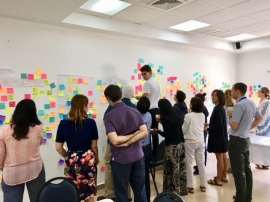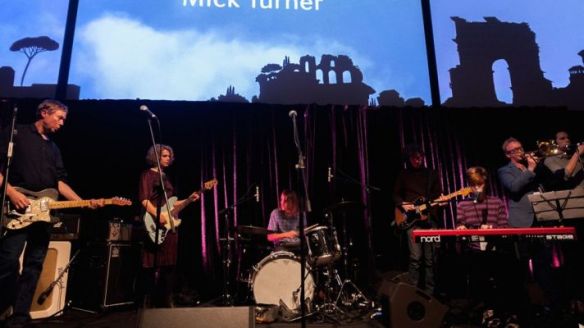My company EnRusk is a global consultancy company working across education, corporate, and not for profits. We use Design Thinking as a method to help organizations innovate, change and create and helping individuals learn how to create as part of a group. We are considered world experts in is Design Thinking and it’s one of the processes we choose to use when appropriate.
Design Thinking is usually talked about as a process to help organizations problem find and then design highly innovative solutions to solve those problems. To achieve that it values empathy and listening specifically when trying to find the right problems that the organization’s users need help with, collaboration over individuality, equality of voice and role over hierarchy, and the idea that we create better together leading to better solutions designed for those problems. Other understandings central to DT and its related processes and toolsets are we learn together and create together fluidity and ambiguity over certainty and absolutes, and nonlinearity over linear pathways. This mirrors a belief that learning never being linear but rather messy.
Most of these values draw from the theoretical position referred to as complexity thinking. Change is central to complexity theory, also a central tenant of DT
The phases of DT are named slightly differently depending on who you talk to but the are essentially the same thing. They are:
Discovery — a phase of immersing into the status quo to find existing problems. This is a phase on data creation and curation.
Synthesis — a phase of synthesizing the data and discovering the real problem, the one you choose to work on.
Ideation — a highly creative phase of idea generation. This is where groups push beyond ideas they should have done yesterday to ideas that will potentially change their world.
Prototyping / Feedback / Testing to Iterate — The phase where we choose an idea and prototype it. In that, we develop tests, testing the assumptions inherent in our prototype to see if the hold-up or are merely assumptions. We also test the impact of each feature and better understand what might need changing to make the service or product even better.
These phases appear to be linear in nature as I have presented them in a linear fashion but they are in fact cyclical, much like all learning.
This past week I was walking with an international school that is working hard to understand who they are and why they exist, what they believe about learning and teaching, and what makes them special. Their values and strategy. The last time I was with them was a month ago where they had immersed deeply in better understanding themselves as a school. This visit was really focused on helping them synthesize their data. Clustering is one tool we use to help our clients synthesize and we had this design team cluster into the themes they saw emerging. Once they had their answers we encouraged them to “mess the data up” and cluster again. By doing so they were continually looking for pain areas to address and opportunities they might have missed.
The ability to synthesis is fundamental to research and learning. It requires the skills of pattern recognition and the ability to allow themes to emerge from the data without biasing the data yourself. It can be hard work and takes time especially if there is a large amount of divergent data to work through. When working with groups of people learning to collectively synthesis for the first time there is a tendency for folk to want to rush this part of the process. To find the first theme they see.
We encourage teams to “sit in your data.”
This visual metaphor implies being comfortable with ambiguity, allowing the data to speak to us, not the other way around.
When synthesizing in larger teams it requires members to have trust in each other, listen to each other, be vulnerable, and be truthful.
Challenging and exciting work.
When facilitating a Design Thinking process consider the following: Getting this part right helps teams find their truth, get it wrong and you will merely point them to yours.







